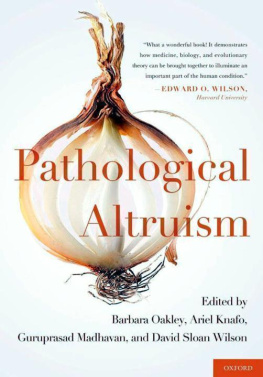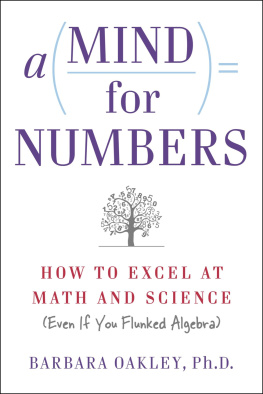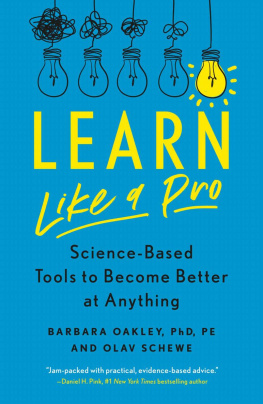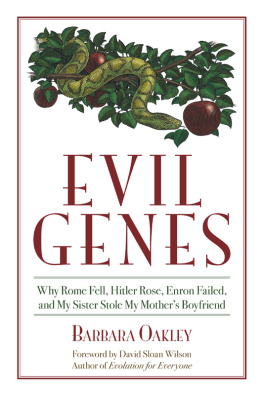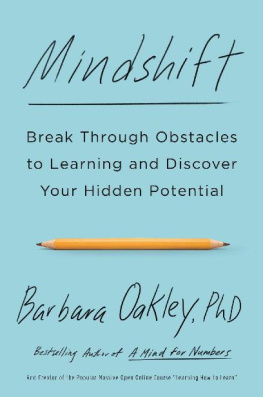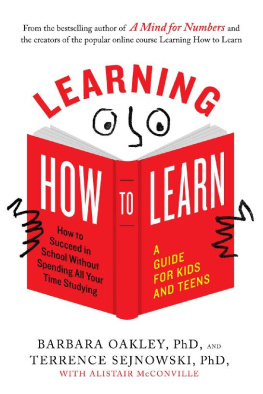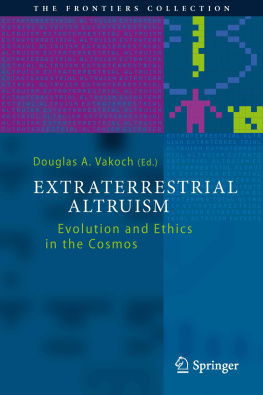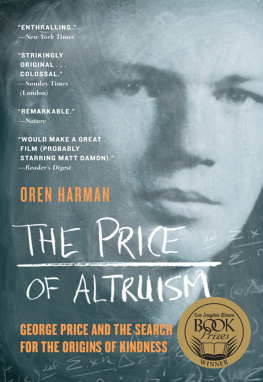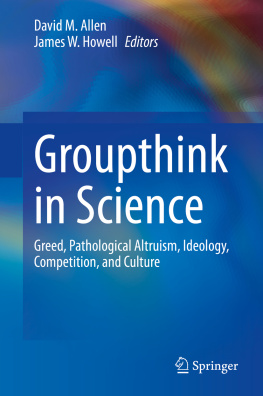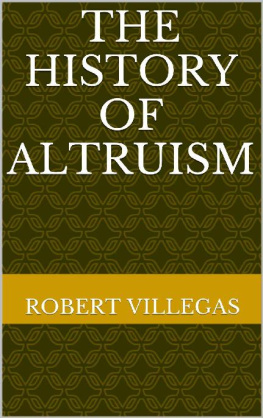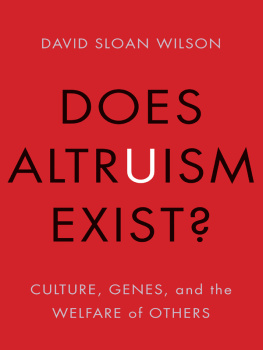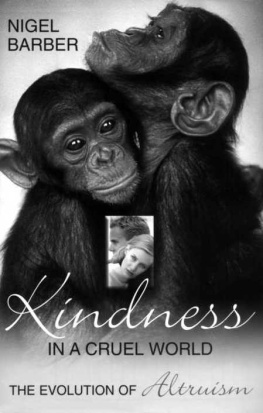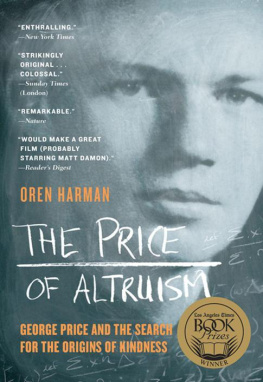"What a wonderful book! This is one of the few books in evolutionary biology I've read in the past ten years that taught me something completely new. It demonstrates how medicine, biology, and evolutionary theory can be brought together to illuminate an important part of the human condition."
-Edward 0. Wilson
Pellegrino University Research Professor Emeritus and Honorary Curator Museum of Comparative Zoology, Harvard University
"Be careful what you wish for' might be one way of summing up the take-home message of this strikingly original book, highlighting the fact that `more is not always better' when it comes to either being the altruist or the recipient of altruism."
-Jay Belsky
Professor of Psychology, Birkbeck University of London
"A hugely valuable and important contribution to a strangely neglected area of both individual psychopathology and our thinking as a society-a book that deserves to be very widely read, and should inform and stimulate discussion not just in psychiatry and psychology, but in our culture at large."
-lain McGilchrist
Former Fellow, All Souls College, Oxford Author of The Master and His Emissary
"While other-regarding actions are rightly deemed the moral alternative to selfishness, and while a new biological science of generosity shows that such prosocial actions are in general associated with flourishing and health in the agent, there is always the problem of a good thing going bad. Barbara Oakley and her colleagues have addressed the dark side of altruism, for the altruistic personality can be manipulated by nefarious ideologies and overwhelmed by excessive expectations, can ignore the due care of the self and be unwise in its application. Pathological Altruism surveys the dark side of a human capacity that is otherwise one of our saving graces. In this regard, altruism, hope, forgiveness, creativity, purpose, and so many positive human assets can easily be distorted. It is good to have such discussions available."
-Stephen G. Post
Director, Center for Medical Humanities, Compassionate Care, and Bioethics Department of Preventive Medicine, Stony Brook University Editor, Altruism and Health: Perspectives from Empirical Science
"Pathological altruism? Sounds like an oxymoron, but this fascinating book quickly convinces you that altruism can go seriously mad and bad. The great breadth and quality of contributors to this book from psychiatry, psychology, and philosophy-and that's just the Ts'-shed light on the dark side of our evolutionary propensity towards altruism, which can be subverted to a wide range of pathologies such as survivor guilt, drug co-dependency, personality disorders, and eating disorders. When within-group altruism is exploited to between-group hostility, it can lead to suicide martyrdom and genocide."
-Robert Plomin
MRC Research Professor and Deputy Director Social, Genetic and Developmental Psychiatry Centre Institute of Psychiatry, King's College London Past-President of the Behavior Genetics Association Author of Behavioral Genetics (now in its 5th edition)
A new perspective regarding altruistic actions and their consequences. Image Kevin Mendez-Aracena and Barbara Oakley
EDITED BY
Barbara Oakley
Ariel Knafo
Guruprasad Madhavan
David Sloan Wilson
FOREWORD BY
Francisco J. Ayala




Whose contributions to this volume are sorely missed
M E P H I S T o P H E L E S: Part of that force which would do ever evil, and does ever good.
-Johann Wolfgang von Goethe
....................................................... xxi
Barbara Oakley, Ariel Knafo, and Michael McGrath
. Pathological altruism might be thought of as any behavior or personal tendency in which either the stated aim or the implied motivation is to promote the welfare of another. But, instead of overall beneficial outcomes, the "altruism" instead has irrational (from the point of view of an outside observer) and substantial negative consequences to the other or even to the self.
. Many harmful deeds-from codependency to suicide martyrdom to genocide-are committed with the altruistic intention to help companions or one's own in-group. Thus, it is worthwhile to study how well-meaning altruism can shade into pathology.
. Studies of pathological altruism provide for a more nuanced and sophisticated understanding of altruism.
Lynn E. O'Connor, Jack W. Berry, Thomas B. Lewis, and David J. Stiver
. Empathic reactions to pain or distress in others are instantaneous and begin the path to both normal and pathological altruism. These reactions move quickly to implicit empathybased guilt, linked to a belief that one should try to relieve the suffering of others.
. Empathic guilt is further linked to evaluations of fairness, equality, and the equitable distributions of resources.
. Survivor guilt (inequity guilt) is a specific form of empathic guilt that tends to become pathogenic when based on a false belief that one's own success, happiness, or well-being is a source of unhappiness for others, simply by comparison. People with high survivor guilt may falsely believe they are "cheaters"
. Pathogenic guilt leads to pathological altruism. In pathological altruism, the altruistic behavior helps no one and potentially harms the altruist, the recipient of the altruism, or both.
. Empathic concern and empathic guilt are evolved psychological mechanisms sustaining mammalian group cohesion. Altruism may fail to favor fitness at the level of the individual in within-group competition, while increasing fitness at the level of the group in between-group competition.
. Pathogenic guilt and pathological altruism are commonly found in mental disorders, such as depression, posttraumatic stress disorder (PTSD), and obsessive-compulsive disorder (OCD).
Roger Vilardaga and Steven C. Hayes
. In the same way that the process of natural evolution selects features of the human species, the cultural environment selects for patterns of behaviors during the lifetime of an individual or a group.
. One particular form of human behavior, language, is of great survival value. But language also amplifies the way we experience both the positive and negative aspects of the world. This can reinforce behaviors that are damaging for individuals and groups.

